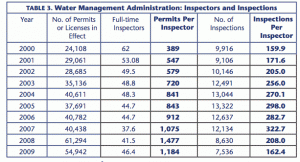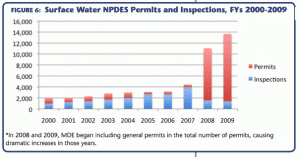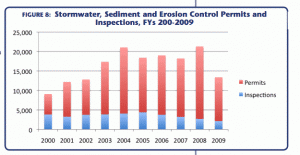15
MD Water Enforcement Falls Short, Report Says
The Maryland Department of the Environment is “drastically underfunded” and lacks the resources needed to enforce water pollution laws, according to a report released this week.
The report, “Failing the Bay: Clean Water Act Enforcement in Maryland Falling Short, ” was commissioned by the Abell Foundation of Baltimore and the Center for Progressive Reform.
The study found that MDE’s budget for Water Management Administration (WMA) declined from $3.39 million to $3.16 million between 2000 and 2009. During the same period, the number of inspectors in Maryland’s water management program declined even more sharply: There were 25 percent fewer active, full-time inspectors in 2009, the report found.
The report criticized WMA’s enforcement program for not effectively deterring dischargers from violating federal and state water quality laws. “MDE’s enforcement efforts are squeezed to the edge of ineffectiveness by an increasingly tight budget and a poorly designed program that fails to maximize its deterrent impact,” the authors concluded.
While Maryland has tough environmental laws, MDE lacks sufficient funding for enforcement and does not currently have an adequate enforcement program to achieve the goals set under the federal Clean Water Act and its own state laws, according to the report’s findings.
The problems are especially pronounced in permit enforcement, the report said. As illustrated by the graph above, MDE has relatively few inspectors for the large number of permits and licenses that need inspection.
Above is another graph from the report, showing how many of the surface water permit sites governed by the NPDES ( National Pollution Discharge Elimination System) and under control of the MDE actually get inspected. In 2008 and 2009,less than one-fourth of the surface-water permit sites actually were inspected.
According the report, inspection rates for stormwater, sediment and erosion control permits were no better. The report’s graph is below.
About Us
Our Stories
- Md. Officials May Temporarily Lift Ban on Female Crab Harvest in Bay
- Scientists, Environmentalists Question Readiness of Chesapeake Bay Disaster Plans
- Inner Harbor Water: Unsafe Bacteria Levels, Test Shows
- Swimmers’ Impressions of Bay Not Always in Sync With Its Health, Scientists Say
- Chesapeake Bay Swim Attracts Hundreds in Balmy Conditions, But Course Includes ‘Dead Zone’


















